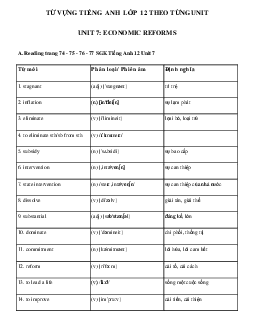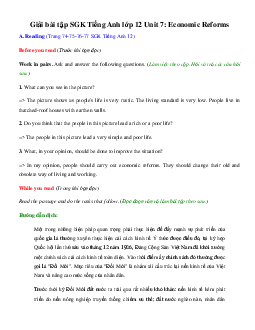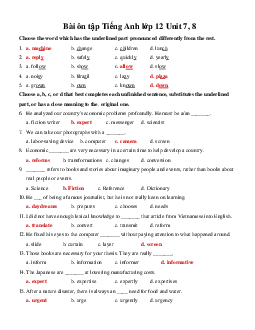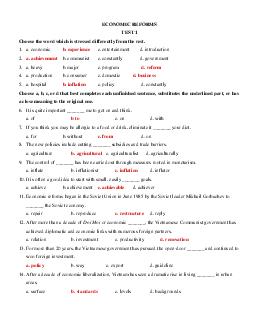




Preview text:
TEST 2
Choose the word which has the underlined part pronounced differently from the rest. 1. a. economy b. industry c. qualify d. priority 2. a. right b. private
c. communist d. minority 3. a. measure b. subsidies c. domestic d. hospital 4. a. though b. encourage c. enough d. country 5. a. improve b. introduce c. move d. lose
Choose a, b, c, or d that best completes each unfinished sentence, substitutes the underlined part, or has
a close meaning to the original one.
6. Economic reforms are often carried _______ to promote the developing of a country. a. out b. on c. for d. in
7. Being aware _____ the importance of economic reforms, the Vietnamese Communist Party initiated an
overall economic reform policy. a. for b. at c. of d. in
8. For more than ten years, we have seen the significant _______ in the economy of our country. a. develop b. developments c. developers d. developed
9. Henry was a studious student. He needed no _______ to work hard. a. encourage
b. encouraging c. encouragement d. encouraged
10. During the time of economic reforms, the economy has grown _______ with only a few major setbacks. a. constant b. constantly c. constants d. constancy
11. The _______ effect of the new policy is that the farmer is now working for himself, and not for the state sake. a. legal b. common c. all d. overall
12. Considering peasants make up nearly 80% of Vietnam's population. a. specialists b. economists c. professors d. farmers
13. The Doi Moi reforms have _______ new possibilities in farming systems research in Vietnam. a. risen b. opened c. renovated d. called
14. The introduction of appropriate farming practices to Vietnam farmers can help them achieve a higher output.
a. productivity b. renovation c. guideline d. achievement
15. This development project could be of great help to the _______ Vietnamese population. a. major b. living c. rural d. domestic
16. In the South, _______ development concentrated on rice cultivation, and nationally, rice and rubber were the main items of export. a. industrial
b. agricultural c. mining d. textile
17. WTO accession also brings serious challenges, requiring Vietnam's economic sectors to open ______ door
to increased foreign competition. a. a b. an c. the d. Ø
18. The plan's highest priority was to develop _______ agriculture. a. a b. an c. the d. Ø
19. Our new neighbors are quite nice _______ they are sometimes talkative. a. despite
b. in spite of the fact c. though d. as though
20. _______ of the difficulty, they managed to climb to the top of the mountain. a. In spite b. Despite c. But d. Although
21. In spite of his hard work, he could not finish the job. a. As hard as he work b. Despite he worked hard
c. Though he worked hard d. Although hard work
22. He went to work despite his headache.
a. nevertheless b. due to c. notwithstanding d. because of
23. Despite _______, we knew that he was guilty. a. denied b. denying c. he denied d. his denial
24. Despite the fact that _______, we enjoyed our trip. a. the weather is bad b. it is a bad weather c. the bad weather d. the weather was bad
25. Julie failed the exam _______ of working very hard. a. despite b. in spite c. even if d. though
26. Tom went to work despite _______.
a. that he did not feel very well
b. of the fact not feeling well c. he did not feel very well
d. not feeling very well
27. Though _______, they are good friends. a. their sometimes quarrel
b. to have a quarrel sometimes
c. they sometimes have a quarrel
d. of having a quarrel sometimes
28. Despite _______, we arrived on time. a. the traffic b. of the traffic c. there was heavy traffic d. of there was heavy traffic
29. John rarely sees Paul _______ they live in the same town. a. notwithstanding b. despite c. in spite of d. although
30. It was very cold _______ she did not put on her coat. a. in case b. but c. even if d. even though
Choose the sentence which has the closest meaning to the original one.
31. Mary tried to keep calm although she was very disappointed.
a. Mary was too disappointed to keep calm.
b. Disappointed as she was, Mary tried to keep calm.
c. Mary lost her temper because of her disappointment.
d. Feeling disappointed, Mary tried to keep calm, but she failed.
32. Even though it was raining heavily, the explorers decided to continue their journey.
a. It rained so heavily that the explorers could not continue their journey.
b. The explorers put off their journey due to the heavy rain.
c. The heavy rain could not prevent the explorers from continuing their journey.
d. If it had rained heavily, the explorers would not have continued their journey.
33. Despite his ability to do the job, he was not offered the position.
a. It was his ability that helped him do the job and get the position.
b. Although he was able to do the job, but he was not offered the position.
c. He was not offered the position, regardless of his ability to, do the job.
d. If he had enough ability to do the job, he would be offered the position.
34. He had worked very hard but he (ailed.
a. Hard as he worked, he failed.
b. Thanks to his hard work, he failed.
c. He did not succeeded because of his being hard working.
d. Even though being hard working, he failed.
35. I did not answer the door even though I knew it was my friend.
a. unless I knew it was my friend, I would not answer the door.
b. I knew it was my friend, but I did not answer the door.
c. Only when I answered the door did I knew it was my friend.
d. I answered the door since I knew it was my friend.
Read the passage carefully and choose the correct answer.
Between 1945 and 1973, the economies of the industrialized nations of Western Europe, Japan, and the
U.S. grew fast enough to vastly improve living standards for their residents. A similarly favorable growth was
registered by some, but far from all, of the developing or industrializing nations, in particular such thriving
Southeast Asian economies as Taiwan, Hong Kong, Singapore, and South Korea. After the devastation of
World War II, a substantial rebuilding boom, combined with lavish flows of aid from the U.S., generated
rapid growth in Western Europe and Japan. American multinational corporations invested heavily in the rest
of the world. Perhaps the most important of all, energy was plentiful and cheap.
Poor nations need aid from the rich nations in the form of capital and of technological and organizational
expertise. They also need easy access to the markets of the industrialized nations for their manufactures and
raw materials. However, the political capacity of rich nations to respond to these needs depends greatly on
their own success in coping with inflation and unemployment. In democratic communities, it is exceedingly
difficult to generate public support for assistance to foreign countries when average wage earners are
themselves under serious financial pressure. It is no. easier politically to permit cheap foreign merchandise
and materials to freely enter American and European markets when they are viewed as the cause of
unemployment among domestic workers.
36. Japan carried out industrialization before World War II. a. True b. False c. No information
37. After World War II, the US invested a lot in many countries. a. True b. False c. No information
38. Vietnam got a lot of investment from the US from 1945 to 1973. a. True b. False c. No information
39. Joining the markets of the industrialized nations is the need of many poor countries. a. True b. False c. No information
40. In many democratic communities, average wage earners are never under serious financial, pressure. a. True b. False c. No information
Fill in each numbered blank with one suitable word or phrase.
Vietnam's economy expanded this year (2007) at the fastest pace since 1996, led by manufacturing and
services, after the country (41) _____ the World Trade Organization.
Gross domestic product (GDP) increased 8.5 percent. Foreign direct (42) ____ jumped to more than $20
billion this year, from $12 billion in 2006. The government is quite (43) _____ to its economic reforms.
Industry and construction account (44) _____ almost 42 percent of Vietnam's GDP. Manufacturing grew 12.8
percent, construction increased 12 percent, and the hotel and restaurant (45) _____ expanded 12.7 percent, according to today's release.
Going forward, Vietnam has a lot of (46) _____ for tourism, which expects Vietnam's economy to expand
8.5 percent in 2008. Vietnam's January (47) _____ to the World Trade Organization released it (48) _____,
U.S. quotas on textile exports and detailed market access to be given to overseas companies, helping
economic (49) _____. The government is targeting economic expansion of about 9 percent next year. Vietnam
is an economy with much development potential and (50) _____ attractive destination for international investors. 41. a. struggled b. organized c. held d. joined 42. a. invest b. investable
c. investment d. investor 43. a. committed b. excited c. called d. encouraged 44. a. over b. for c. at d. in 45. a. role b. region c. sector d. section 46. a. potential b. private c. stagnancy d. exports 47. a. walk b. path c. way d. accession 48. a. in b. at c. for d. from 49. a. grow b. growth c. grew d. grown 50. a. a b. an c. the d. Ø



